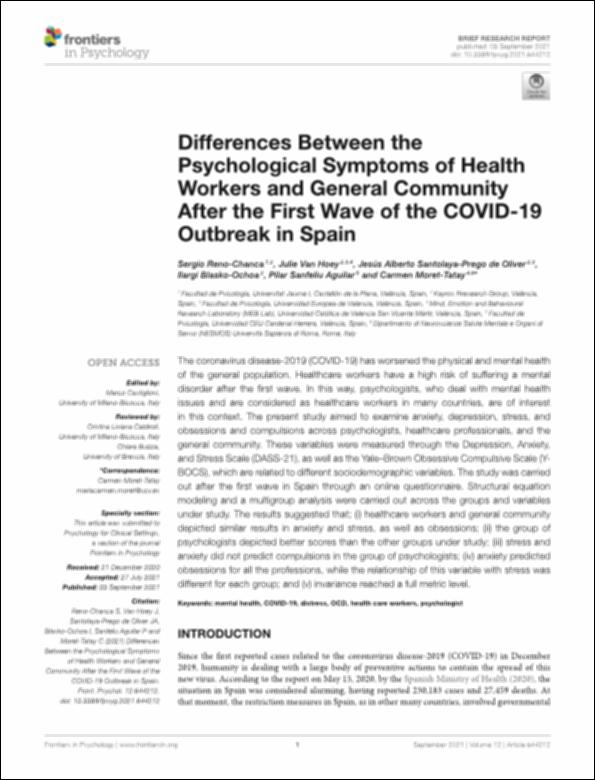Please use this identifier to cite or link to this item:
http://hdl.handle.net/10637/13648Differences between the psychological symptoms of health workers and general community after the first wave of the COVID-19 outbreak in Spain
| Title: | Differences between the psychological symptoms of health workers and general community after the first wave of the COVID-19 outbreak in Spain |
| Authors : | Reno Chanca, Sergio Hoey, Julie van Santolaya Prego de Oliver, Jesús Alberto Blasko Ochoa, Ilargi Sanfeliu Aguilar, Pilar Moret Tatay, Carmen |
| Keywords: | Población - Salud mental - España.; Population - Mental health - Spain.; Psychologists - Mental health - Spain.; Anxiety.; Psicólogos - Salud mental - España.; COVID-19 - España.; Angustia.; COVID-19 (Disease) - Spain. |
| Publisher: | Frontiers Media |
| Citation: | Reno-Chanca, S., Van Hoey, J., Santolaya-Prego de Oliver, J. A., Blasko-Ochoa, I., Sanfeliu Aguilar, P. & Moret-Tatay, C. (2021). Differences between the psychological symptoms of health workers and general community after the first wave of the COVID-19 outbreak in Spain. Frontiers in Psychology, vol. 12, art. 644212 (03 sep.). DOI: https://doi.org/10.3389/fpsyg.2021.644212 |
| Abstract: | The coronavirus disease-2019 (COVID-19) has worsened the physical and mental health of the general population. Healthcare workers have a high risk of suffering a mental disorder after the first wave. In this way, psychologists, who deal with mental health issues and are considered as healthcare workers in many countries, are of interest in this context. The present study aimed to examine anxiety, depression, stress, and obsessions and compulsions across psychologists, healthcare professionals, and the general community. These variables were measured through the Depression, Anxiety, and Stress Scale (DASS-21), as well as the Yale–Brown Obsessive Compulsive Scale (YBOCS), which are related to different sociodemographic variables. The study was carried out after the first wave in Spain through an online questionnaire. Structural equation modeling and a multigroup analysis were carried out across the groups and variables under study. The results suggested that; (i) healthcare workers and general community depicted similar results in anxiety and stress, as well as obsessions; (ii) the group of psychologists depicted better scores than the other groups under study; (iii) stress and anxiety did not predict compulsions in the group of psychologists; (iv) anxiety predicted obsessions for all the professions, while the relationship of this variable with stress was different for each group; and (v) invariance reached a full metric level. |
| Description: | Este artículo se encuentra disponible en la siguiente URL: https://www.frontiersin.org/articles/10.3389/fpsyg.2021.644212/full |
| URI: | http://hdl.handle.net/10637/13648 |
| Rights : | http://creativecommons.org/licenses/by/4.0/deed.es |
| ISSN: | 1664-1078 (Electrónico) |
| Issue Date: | 3-Sep-2021 |
| Center : | Universidad Cardenal Herrera-CEU |
| Appears in Collections: | Dpto. Medicina y Cirugía |
Items in DSpace are protected by copyright, with all rights reserved, unless otherwise indicated.


